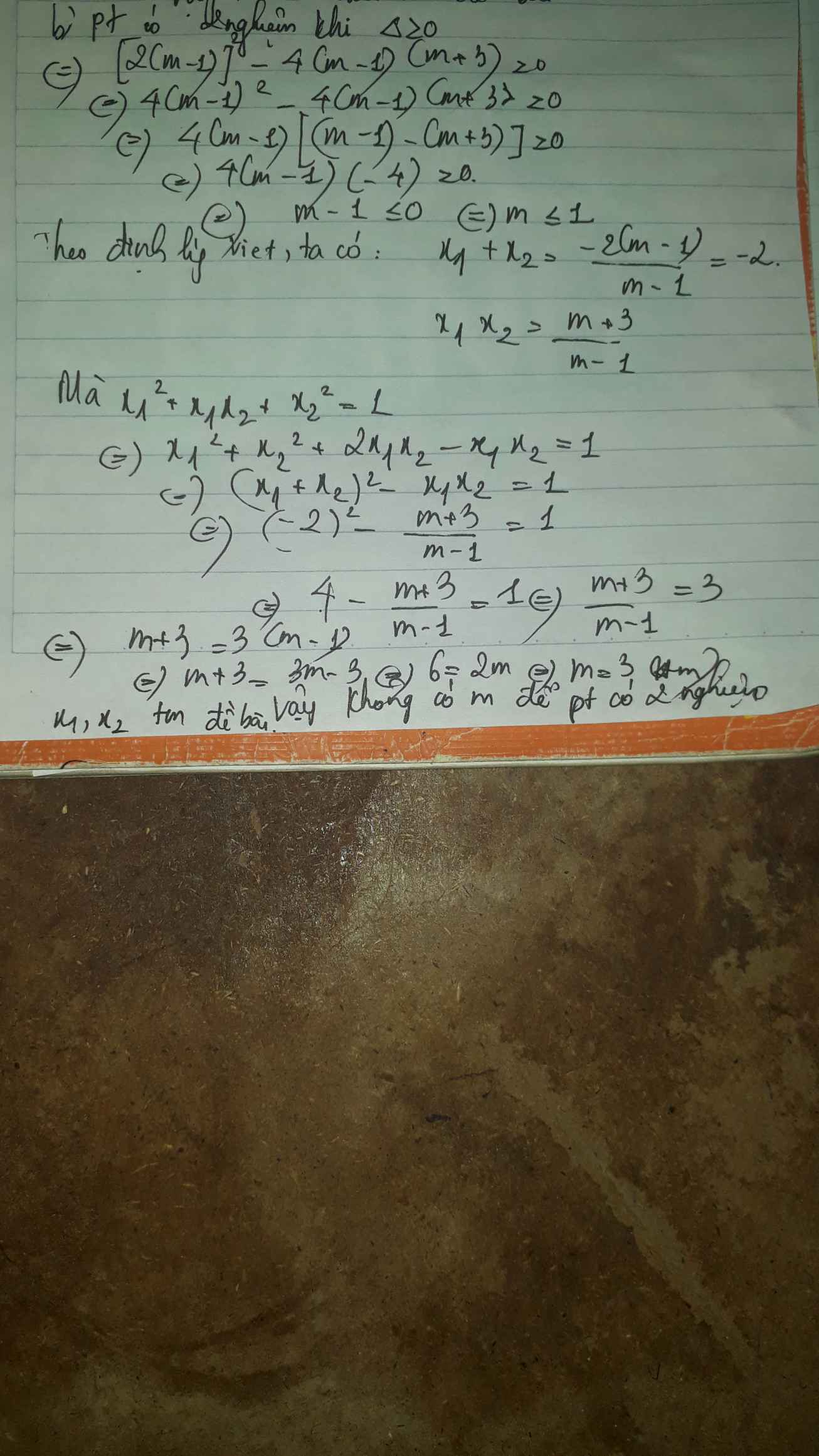Hãy nhập câu hỏi của bạn vào đây, nếu là tài khoản VIP, bạn sẽ được ưu tiên trả lời.

b) phương trình có 2 nghiệm \(\Leftrightarrow\Delta'\ge0\)
\(\Leftrightarrow\left(m-1\right)^2-\left(m-1\right)\left(m+3\right)\ge0\)
\(\Leftrightarrow m^2-2m+1-m^2-3m+m+3\ge0\)
\(\Leftrightarrow-4m+4\ge0\)
\(\Leftrightarrow m\le1\)
Ta có: \(x_1^2+x_1x_2+x_2^2=1\)
\(\Leftrightarrow\left(x_1+x_2\right)^2-2x_1x_2=1\)
Theo viet: \(\left\{{}\begin{matrix}x_1+x_2=-\dfrac{b}{a}=2\left(m-1\right)\\x_1x_2=\dfrac{c}{a}=m+3\end{matrix}\right.\)
\(\Leftrightarrow\left[-2\left(m-1\right)^2\right]-2\left(m+3\right)=1\)
\(\Leftrightarrow4m^2-8m+4-2m-6-1=0\)
\(\Leftrightarrow4m^2-10m-3=0\)
\(\Leftrightarrow\left[{}\begin{matrix}m_1=\dfrac{5+\sqrt{37}}{4}\left(ktm\right)\\m_2=\dfrac{5-\sqrt{37}}{4}\left(tm\right)\end{matrix}\right.\Rightarrow m=\dfrac{5-\sqrt{37}}{4}\)

a, bạn tự làm
b, \(\Delta'=\left(m+2\right)^2-\left(m^2+m+3\right)=m^2+4m+4-m^2-m-3\)
\(=3m+1\)để pt có 2 nghiệm \(m\ge-\dfrac{1}{3}\)
Ta có \(\dfrac{x_1^2+x_2^2}{x_1x_2}=4\Leftrightarrow\dfrac{\left(x_1+x_2\right)^2-2x_1x_2}{x_1x_2}=4\Rightarrow\left(x_1+x_2\right)^2-6x_1x_2=0\)
\(\Rightarrow4\left(m+2\right)^2-6\left(m^2+m+3\right)=0\)
\(\Leftrightarrow4m^2+16m+16-6m^2-6m-18=0\)
\(\Leftrightarrow-2m^2+10m-2=0\Leftrightarrow m^2-5m+1=0\Leftrightarrow m=\dfrac{5\pm\sqrt{21}}{2}\)(tm)

a. Với m=6 thì phương trình (1) có dạng
x^2 - 5x +4= 0
<=> (x-1)(x-4)=0
<=> x=1 hoặc x=4
Vậy m=6 thì phương trình có nghiệm x=1 hoặc x=4
b. Xét \(\text{ Δ}=\left(-5\right)^2-4\cdot1\cdot\left(m-2\right)=33-4m\)
Để (1) có nghiệm phân biệt khi \(m< \dfrac{33}{4}\)
Theo Vi-et ta có: \(x_1x_2=m-2;x_1+x_2=5\)
Để 2 nghiệm phương trình (1) dương khi m>2
Ta có:
\(\dfrac{1}{\sqrt{x_1}}+\dfrac{1}{\sqrt{x_2}}=\dfrac{3}{2}\Leftrightarrow\dfrac{1}{x_1}+\dfrac{1}{x_2}+\dfrac{2}{\sqrt{x_1x_2}}=\dfrac{9}{4}\\ \Leftrightarrow\dfrac{x_1+x_2}{x_1x_2}+\dfrac{2}{\sqrt{x_1x_2}}=\dfrac{9}{4}\\ \Leftrightarrow\dfrac{5}{m-2}+\dfrac{2}{\sqrt{m-2}}=\dfrac{9}{4}\Leftrightarrow20+8\sqrt{m-2}=9\left(m-2\right)\\ \Leftrightarrow\left(\sqrt{m-2}-2\right)\left(9\sqrt{m-2}+10\right)=0\Leftrightarrow\sqrt{m-2}=2\Leftrightarrow m-2=4\Leftrightarrow m=6\left(t.m\right)\)

\(\Delta=\left[-2\left(m+1\right)\right]^2-4\left(m^2-3\right)\)
\(=4m^2+8m+4-4m^2+12=8m+16\)
Để phương trình có hai nghiệm thì 8m+16>=0
hay m>=-2
Áp dụng hệ thức Vi-et, ta được:
\(\left\{{}\begin{matrix}x_1+x_2=2\left(m+1\right)\\x_1x_2=m^2-3\end{matrix}\right.\)
Theo đề, ta có: \(x_1^2+x_2^2+1=3x_1x_2\)
\(\Leftrightarrow\left(x_1+x_2\right)^2-5x_1x_2+1=0\)
\(\Leftrightarrow\left(2m+2\right)^2-5\left(m^2-3\right)+1=0\)
\(\Leftrightarrow4m^2+8m+4-5m^2+15+1=0\)
\(\Leftrightarrow-m^2+8m+20=0\)
=>(m-10)(m+2)=0
=>m=10 hoặc m=-2
a, \(\Delta'=\left(m+1\right)^2-\left(m^2-3\right)=m^2+2m+1-m^2+3=2m+4\)
Để pt có 2 nghiệm x1 ; x2 khi \(\Delta'\ge0\Leftrightarrow m\ge-2\)
Theo Vi et \(\left\{{}\begin{matrix}x_1+x_2=2m+2\\x_1x_2=m^2-3\end{matrix}\right.\)
Ta có : \(\dfrac{x_1}{x_2}+\dfrac{x_2}{x_1}+\dfrac{1}{x_1x_2}=3\Leftrightarrow\dfrac{\left(x_1+x_2\right)^2-2x_1x_2+1}{x_1x_2}=3\)
\(\Leftrightarrow\dfrac{4\left(m^2+2m+1\right)-2\left(m^2-3\right)+1}{m^2-3}=3\)
\(\Rightarrow2m^2+8m+11=3m^2-9\Leftrightarrow m^2-8m-20=0\Leftrightarrow m=10;m=-2\)(tm)

b1: tìm đk m t/m: Δ>0 ↔ m∈(\(\dfrac{1-\sqrt{10}}{2}\) ; \(\dfrac{1+\sqrt{10}}{2}\))
b2: ➝x1+x2 =-2m-1 (1)
→ x1.x2=m^2-1 (2)
b3: biến đổi : (x1-x2)^2 = x1-5x2
↔ (x1+x2)^2 -4.x1.x2 -(x1+x2) +6.x2=0
↔4.m^2 +4m +1 - 4.m^2 +4 +2m+1+6. x2=0
↔x2= -m-1
B4: thay x2= -m-1 vào (1) → x1 = -m
Thay x2 = -m-1, x1 = -m vào (2)
→m= -1
B5: thử lại:
Với m= -1 có pt: x^2 -x =0
Có 2 nghiệm x1=1 và x2=0 (thoả mãn)

a, bạn tự làm
b, Thay x = 3 vào pt trên ta được
\(9-3m-3=0\Leftrightarrow6-3m=0\Leftrightarrow m=2\)
Thay m = 2 vào ta được \(x^2-2x-3=0\)
Ta có a - b + c = 1 + 2 - 3 = 0
vậy pt có 2 nghiệm x = -1 ; x = 3
c, \(\Delta=m^2-4\left(-3\right)=m^2+12>0\)
vậy pt luôn có 2 nghiệm pb
\(x_1x_2+5\left(x_1+x_2\right)-1997=0\)
\(\Rightarrow-3+5m-1997=0\Leftrightarrow5m-2000=0\Leftrightarrow m=400\)

Để (1) có 2 nghiệm dương \(\Rightarrow\left\{{}\begin{matrix}\Delta'=\left(m+3\right)^2-m-1\ge0\\x_1+x_2=2\left(m+3\right)>0\\x_1x_2=m+1>0\end{matrix}\right.\) \(\Rightarrow m>-1\)
\(P=\left|\dfrac{\sqrt{x_1}-\sqrt{x_2}}{\sqrt{x_1x_2}}\right|>0\Rightarrow P^2=\dfrac{\left(\sqrt{x_1}-\sqrt{x_2}\right)^2}{x_1x_2}\)
\(P^2=\dfrac{x_1+x_2-2\sqrt{x_1x_2}}{x_1x_2}=\dfrac{2\left(m+3\right)-2\sqrt{m+1}}{m+1}=\dfrac{4}{m+1}-\dfrac{2}{\sqrt{m+1}}+2\)
\(P^2=\left(\dfrac{2}{\sqrt{m+1}}-\dfrac{1}{2}\right)^2+\dfrac{7}{4}\ge\dfrac{7}{4}\Rightarrow P\ge\dfrac{\sqrt{7}}{2}\)
Dấu "=" xảy ra khi \(\sqrt{m+1}=4\Rightarrow m=15\)

a. thay m=-4 vào (1) ta có:
\(x^2-5x-6=0\)
Δ=b\(^2\)-4ac= (-5)\(^2\) - 4.1.(-6)= 25 + 24= 49 > 0
\(\sqrt{\Delta}=\sqrt{49}=7\)
x\(_1\)=\(\dfrac{-b+\sqrt{\Delta}}{2a}=\dfrac{5+7}{2}\)=6
x\(_2\)=\(\dfrac{-b-\sqrt{\Delta}}{2a}=\dfrac{5-7}{2}\)=-1
vậy khi x=-4 thì pt đã cho có 2 nghiệm x\(_1\)=6; x\(_2\)=-1